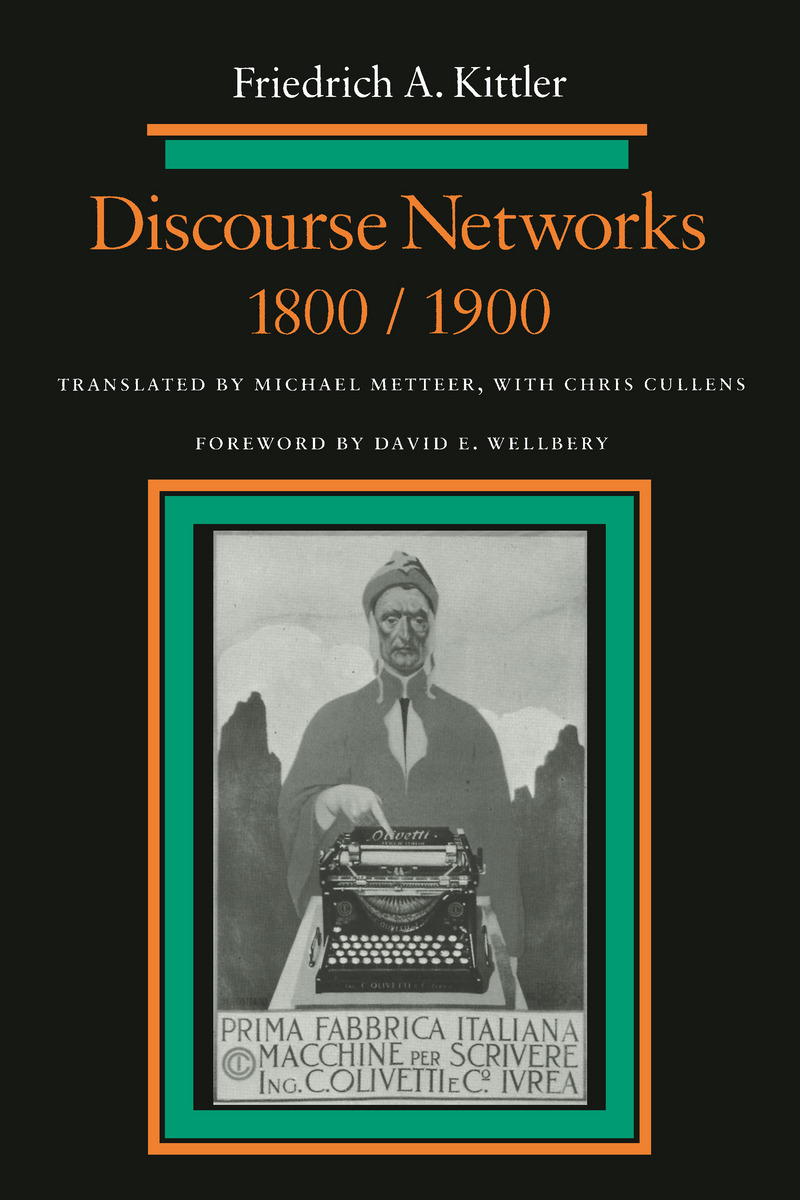Friedrich A. Kittler: Discourse Networks 1800/1900 (1985–) [German, English]
Filed under book | Tags: · communication, discourse, history of literature, language, literary theory, literature, media, media archeology, media technology, media theory, philosophy, psychoanalysis, psychophysics, technology, writing

“This is a highly original book about the connections between historical moment, social structure, technology, communication systems, and what is said and thought using these systems–notably literature. Friedrich Kittler focuses on the differences between ‘discourse networks’ in 1800 and in 1900, in the process developing a new analysis of the shift from romanticism to modernism. The artful structure of the book begins with Goethe’s Faust and ends with Valéry’s Faust. In the 1800 section, the author discusses how language was learned, the emergence of the modern university, the associated beginning of the interpretation of contemporary literature, and the canonization of literature. Among the writers and works Kittler analyzes in addition to Goethe’s Faust are Schlegel, Hegel, E.T.A. Hoffman’s The Golden Pot, and Goethe’s Tasso. The 1900 section argues that the new discourse network in which literature is situated in the modern period is characterized by new technological media–film, the photograph, and the typewritten page–and the crisis that these caused for literary production. Along the way, the author discusses the work of Nietzsche, Gertrude Stein, Mallarmé, Bram Stroker, the Surrealists, Rilke, Kafka, and Freud, among others.”
Aufschreibesysteme 1800/1900
First published in 1985
Third, completely revised edition
Publisher Wilhelm Fink Verlag, Munich, 1995
ISBN 3770528816, 9783770528813
524 pages
Discourse Networks, 1800/1900
Translated by Michael Metteer, with Chris Cullens
Foreword by David E. Wellbery
Publisher Stanford University Press, 1990
ISBN 9780804720991
496 pages
Reviews: Franz Futterknecht and David Wellbery (Poetics Today, 1987, EN), Robert C. Holub (German Quarterly, 1987, EN), Thomas Sebastian (MLN, 1990, EN).
Wikipedia (DE)
Publisher (DE)
Publisher (EN)
Aufschreibesysteme 1800/1900 (German, 3rd ed., 1985/1995, removed on 2024-2-6 upon request from Brill)
Discourse Networks, 1800/1900 (English, 1990, updated to the full book on 2014-1-30 via poshumano, updated to single-page OCR’d version on 2014-1-31 via Marcell Mars)
Online version of Index of persons (at Monoskop wiki)
Comments (3)Michel Henry: Barbarism (1987/2012)
Filed under book | Tags: · art, capitalism, critique, critique of science, critique of technology, culture, education, philosophy, philosophy of science, science, technology

Barbarism represents a critique, from the perspective of Michel Henry’s unique philosophy of life, of the increasing potential of science and technology to destroy the roots of culture and the value of the individual human being. For Henry, barbarism is the result of a devaluation of human life and culture that can be traced back to the spread of quantification, the scientific method and technology over all aspects of modern life. The book develops a compelling critique of capitalism, technology and education and provides a powerful insight into the political implications of Henry’s work. It also opens up a new dialogue with other influential cultural critics, such as Marx, Husserl, and Heidegger.
First published in French in 1987, Barbarism aroused great interest as well as virulent criticism. Today the book reveals what for Henry is a cruel reality: the tragic feeling of powerlessness experienced by the cultured person. Above all he argues for the importance of returning to philosophy in order to analyse the root causes of barbarism in our world.
Originally published in French as La Barbarie by Editions Grasset & Fasquelle, 1987
Translated by Scott Davidson
Publisher Continuum, London/New York, 2012
Volume 95 of Continuum Impacts
ISBN 1441132651, 9781441132659
168 pages
wikipedia
publisher
google books
PDF
PDF (Alt link, added on 2014-1-21)
Henning Schmidgen: Das Unbewußte Der Maschinen: Konzeptionen Des Psychischen Bei Guattari, Deleuze Und Lacan (1997) [German]
Filed under book | Tags: · desiring machines, machine, philosophy, philosophy of technology, psychoanalysis, technology

25 Jahre nach Erscheinen des «Anti-Ödipus», jener furiosen Abrechnung mit Strukturalismus, Marxismus und Psychoanalyse à la française von Gilles Deleuze und Félix Guattari, sind die dereinst gefeierten oder heftig befehdeten «Wunschmaschinen» erneut Thema. Frei von Exaltationen der damaligen Rezeption, fast aufreizend nüchtern rekonstruiert Henning Schmidgen den Maschinenbegriff der Autoren, wobei er den meist vernachlässigten Guattari in den Vordergrund rückt. Das ist solide, aber bleibt thematisch eng und dürfte wohl nur Experten interessieren. Anschlüsse zur zeitgenössischen Technikphilosophie werden angedeutet, nicht ausgeführt; das gleiche gilt für Bezüge zu Heidegger oder Parallelen zu Bloch. Von grösserem Interesse ist sicher, was der Autor über die Beziehungen zwischen Guattari und Lacan zu sagen hat. Den nicht so sehr am «Anti-Ödipus» Interessierten sei der Teil über Lacan ans Herz gelegt: ein sorgfältiger Nachvollzug des von Lacan im Kontext seines Seminars über E. A. Poes «Entwendeten Brief» unternommenen Versuchs, Freuds Wiederholungszwang als Wiederholungs automatismus zu rekonstruieren. Dass es Schmidgen gelingt, Lacans Analyse der Regularitäten von Wiederholungsvorgängen mittels Symbolgruppen verständlich zu erklären, ist dem Autor hoch anzurechnen.
Publisher Wilhelm Fink Verlag, Muenchen, 1997
ISBN 3770531957, 9783770531950
188 pages

